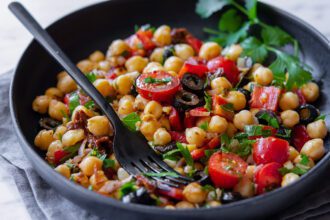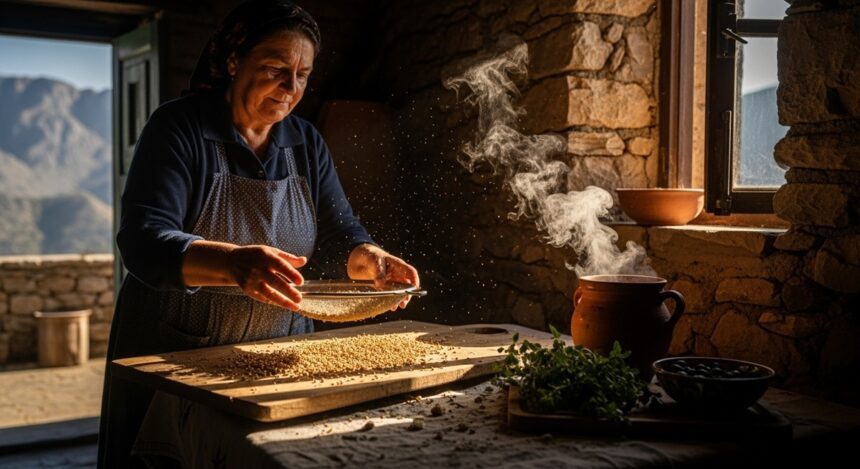If you’ve ever wondered how the ancient Greeks managed to build empires, sculpt masterpieces, and party like gods without keeling over, the answer isn’t just in their myths—it’s on their plates. Long before kale smoothies and acai bowls dominated Instagram feeds, the Mediterranean shores were brimming with Greek superfoods that fueled legends and longevity. These are time-tested treasures straight from the cradle of Western civilization, packed with nutrients that modern science is only now catching up to.
In a world obsessed with trendy wellness fads, turning back to these ancient staples feels like rediscovering a lost scroll of wisdom. From the sun-drenched groves of Crete to the rugged mountains of the mainland, Greek superfoods offer a blueprint for vitality that even Zeus might envy. Imagine blending them into your morning routine—suddenly, you’re not just sipping a shake; you’re channeling Olympian energy.
But why are these foods making a comeback among celebrities, athletes, and everyday health enthusiasts? It’s simple: they deliver real results without the hype. In this deep dive, we’ll explore five powerhouse Greek superfoods, unpacking their history, health benefits, and practical tips for incorporating them into your life. Whether you’re aiming for glowing skin, a fortified immune system, or just a taste of divine indulgence, these picks are your ticket to feeling immortal.
The Timeless Appeal of Greek Superfoods
Before we jump into the specifics, let’s set the stage. The Greek diet, often hailed as the gold standard of Mediterranean eating, isn’t a modern invention—it’s rooted in millennia of tradition. Ancient texts from Hippocrates, the father of medicine, praised foods like olive oil and herbs for their healing properties. Fast-forward to today, and studies from institutions like Harvard’s School of Public Health confirm what the Greeks knew all along: a diet rich in these elements slashes risks of heart disease, inflammation, and even cognitive decline.
What makes Greek superfoods stand out? It’s their purity. Grown in nutrient-rich soils under the relentless Aegean sun, they’re often organic by default, free from heavy processing. Plus, they’re versatile—drizzle, sip, or spread them for an instant upgrade to any meal. And with sustainability in mind, many are harvested wild or from small family farms, supporting eco-friendly practices that align with today’s green living trends.
Celebrities aren’t immune to their allure. From Hollywood A-listers to wellness gurus, these foods are sneaking into elite routines. But don’t take my word for it; let’s break down the top five that deserve a spot in your pantry.
Extra Virgin Olive Oil: The Liquid Gold of the Gods
Ah, extra virgin olive oil—if there’s one Greek superfood that embodies eternal youth, this is it. Dubbed “liquid gold” by Homer himself in the Iliad, it’s been a staple since ancient times, when athletes rubbed it on their bodies for shine and strength. Today, it’s the cornerstone of the Mediterranean diet, and for good reason.

Health Benefits Backed by Science
Loaded with monounsaturated fats and polyphenols, extra virgin olive oil fights inflammation like a Spartan warrior. Research from the Journal of the American College of Cardiology shows it can lower bad cholesterol levels and reduce stroke risk by up to 30%. Its antioxidants, like oleocanthal, mimic the effects of ibuprofen, easing joint pain without the pills.
For skin health? Jennifer Aniston credits it for her ageless glow, using it as a moisturizer and in salads. It’s rich in vitamin E, which combats free radicals and promotes collagen production. Drizzle it daily, and you might just fend off wrinkles better than any serum.
Historical and Mythical Roots
Legend has it that Athena gifted the olive tree to Athens, outbidding Poseidon in a divine contest. This wasn’t just folklore; olives were currency in ancient Greece, traded like gold. Harvested from varieties like Koroneiki, Greek extra virgin olive oil is cold-pressed to preserve its potency, unlike refined versions that lose their magic.
In mythology, Zeus might have wielded thunderbolts, but a bottle of this oil could have been his secret weapon for immortality. It’s no wonder it’s a UNESCO-recognized part of intangible cultural heritage.
How to Incorporate It Into Your Routine
Start simple: Swap your cooking oils for extra virgin olive oil in dressings, dips, or even baking. Try a classic Greek salad—tomatoes, cucumbers, feta, and a generous pour. For beauty, mix it with honey for a face mask. Pro tip: Look for PDO-certified bottles from regions like Crete for the purest flavor. Aim for 2-3 tablespoons daily to reap the rewards.
Greek Thyme Honey: Nature’s Antibacterial Elixir
Move over, manuka—Greek thyme honey is the unsung hero of the hive world. Harvested from wild thyme blossoms in remote islands like Crete and Ikaria, this amber nectar isn’t just sweet; it’s a medicinal marvel that Kourtney Kardashian swears by for her holistic lifestyle.

Potent Healing Properties
What sets Greek thyme honey apart? Its high thymol content, a natural antiseptic that rivals antibiotics in fighting bacteria. A study in the Journal of Agricultural and Food Chemistry found it effective against respiratory infections and even some drug-resistant strains. It’s also brimming with antioxidants that boost immunity and soothe sore throats faster than tea alone.
For gut health, its prebiotic qualities nurture beneficial bacteria, aiding digestion. And let’s not forget its role in wound healing—ancient Greeks used it on battle scars, a practice echoed in modern apitherapy.
Ties to Greek Lore and Tradition
Artemis, the huntress goddess, was said to favor bees and wild herbs, making this honey her perfect tribute. In folklore, it’s the “food of the gods,” collected from mountains where nymphs roamed. Ikaria, one of the world’s Blue Zones, attributes its centenarians’ longevity partly to this honey, consumed daily with yogurt or tea.
If heartbreak strikes, as the original article quips, slather it on bread and recite Homer—it’s that comforting.
Everyday Uses and Recipes
Stir Greek thyme honey into herbal teas for a natural cough syrup, or drizzle over cheese for a gourmet snack. For a smoothie Zeus would approve: Blend with Greek yogurt, berries, and a dash of cinnamon. Seek raw, unfiltered varieties to maximize benefits—store in a cool spot to preserve its enzymes.
Dittany of Crete: The Legendary Herb of Healing
Perched on Crete’s cliffs like a guarded secret, dittany of Crete (Origanum dictamnus) is the herb that whispers ancient spells. Gwyneth Paltrow might stock it in her Goop arsenal, but its roots run deep in Greek pharmacology.

Medicinal Magic Unveiled
This aromatic powerhouse is a digestive aid, calming stomachs and reducing bloating with its carvacrol compounds. Herbalists praise its anti-inflammatory effects for easing menstrual cramps and headaches. A 2019 study in Phytotherapy Research highlighted its antimicrobial properties, making it a go-to for natural remedies.
In aromatherapy, its essential oil promotes relaxation, combating stress like a mythical shield.
Mythology and Cultural Significance
Hecate, goddess of witchcraft and herbs, would have brewed dittany of Crete in her cauldrons. Ancient texts by Dioscorides describe it healing arrow wounds—fitting for Crete, birthplace of Zeus. It’s so rare that harvesting it feels like a quest, limited to wild growth on rocky terrains.
Brewing and Beyond
Steep dittany of Crete as tea for a soothing ritual: One teaspoon per cup, infused for 5 minutes. Add to marinades for meats or salads for an herby kick. Caution: Pregnant women should consult doctors, as it’s potent. Source ethically from Cretan suppliers to support conservation.
Greek Mountain Tea: The Altitude-Brewed Antioxidant Powerhouse
Known as “tsai tou vounou” or sideritis, Greek mountain tea is the caffeine-free elixir that Penélope Cruz sips for serenity. Harvested from high elevations, it’s like bottled mountain air in herbal form.

Boosting Body and Mind
Packed with flavonoids, Greek mountain tea combats oxidative stress, per research in the European Journal of Nutrition. It’s stellar for colds, reducing inflammation in the respiratory system, and even alleviating anxiety without drowsiness. For longevity, its iron content (sideritis means “he who is made of iron”) supports blood health.
Greek grandmothers, or yiayias, brew it for everything from hangovers to high blood pressure—proving folk wisdom aligns with science.
From Hermes to Modern Wellness
Hermes, the swift messenger god, might have fueled his journeys with this tea. Endemic to Greece’s peaks, it’s a symbol of resilience, thriving in harsh conditions. In Blue Zones like Ikaria, it’s a daily ritual linked to extended lifespans.
Simple Sipping Strategies
Boil stems and flowers for 5-10 minutes, strain, and enjoy plain or with lemon. Pair with honey for a superfood duo. It’s versatile in cocktails too—infuse in gin for a herbal twist. Stock up on organic bundles for authenticity.
Greek Yogurt: The Creamy Foundation of Divine Nutrition
Last but not least, Greek yogurt—the thick, tangy icon that Rihanna layers in her parfaits. Strained to perfection, it’s far superior to regular yogurt, with double the protein and half the sugar.

Nutritional Knockouts
Probiotics in Greek yogurt balance gut flora, improving digestion and immunity, as noted in the American Journal of Clinical Nutrition. Its high protein (up to 20g per serving) aids muscle repair and satiety, making it a weight-management ally. Calcium and B vitamins support bone health and energy.
Hera, queen of the gods, would approve its “goddess energy” for hormone balance.
Ancient Origins and Evolution
Fermented milk dates to nomadic tribes, but Greeks perfected the straining process. In myths, it echoed ambrosia, the gods’ sustenance. Today, it’s a global phenomenon, but authentic Greek versions use sheep or goat milk for richer flavor.
Creative Culinary Ideas
Top Greek yogurt with fruits, nuts, and honey for ambrosia 2.0. Use in smoothies, dips like tzatziki, or baking for moisture. Opt for full-fat, plain varieties to avoid additives—Fage for starters.
Embracing the Greek Superfood Lifestyle for Lasting Vitality
Incorporating these Greek superfoods isn’t about chasing trends; it’s about reclaiming a heritage of health that stands the test of time. Start small—swap your morning coffee for mountain tea, your dressing for olive oil—and watch the transformation. They’re a philosophy: eat simply, live fully, and age gracefully.
Whether you’re prepping for a marathon or just surviving Monday, these picks offer sustainable energy without the crash. And in a nod to the gods, build that mezze platter—olives, yogurt dips, honey-drizzled bread—and toast to your inner deity. After all, Greece didn’t just invent democracy; it mastered the art of thriving.






















